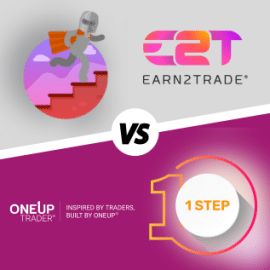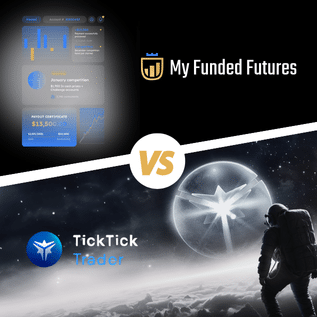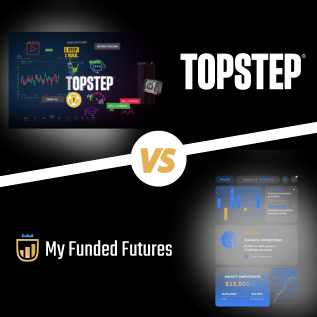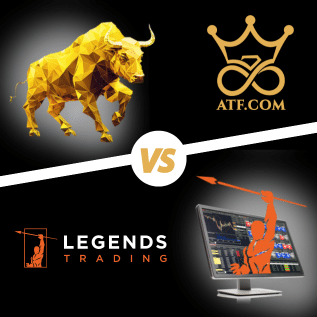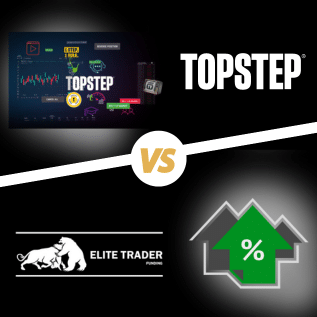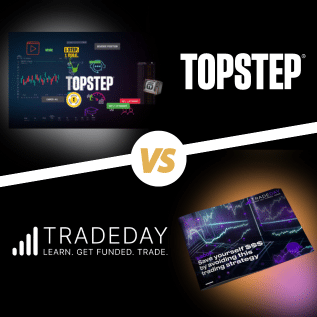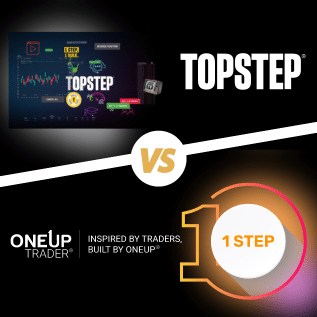Earn2Trade VS OneUp Trader
Overview
This piece is a comparison of two industry-leading proprietary trading firms, Earn2Trade and OneUp Trader. Both platforms provide prospective traders with the opportunity to demonstrate their abilities and qualify for funded trading accounts, but each serves difference requirements and levels of experience. We’ll look here at the main distinctions between the two, and what factors to take into account when deciding which firm is the better fit for you.
Earn2Trade is located in the US and boasts more than seven years of expertise in the prop trading industry under the guidance of CEO Osvaldo Guimarãe. The firm provides access to several platforms, such as NinjaTrader, Overcharts, Trader Pro and Finamark, catering to a range of trading preferences and strategies. Its affiliations with brokers such as EdgeClear, Advantage Futures and Phillip Capital are indicative of a robust trading infrastructure.
Earn2Trade’s accounts start at $25,000 and go as high as $400,000, accommodating a broad spectrum of traders, from those preferring to play it safely to more uncompromising traders with a higher degree of experience. The straightforward one-stage evaluation process may appeal in particular to traders looking to gain fast access to funded accounts. Profit targets vary according to challenge, ranging from $1,750 to $11,000, as do maximum total drawdowns which are between $1,500 and $6,000.
The firm specialises solely in futures trading, providing traders with access to all of the CME Group’s assets, including CME, CBOT, NYMEX, and COMEX. This narrow focus demonstrates a strong commitment to futures traders, and the inclusion of Micros facilitates easier entry for traders preferring smaller contract sizes.
OneUp Trader is another prop trading firm based in the US, specifically in Wilmington, Delaware. It operates by identifying talented traders who can complete its assessment process and matching them with reputable funding partners. Traders can secure funding of between $25,000 and $250,000, with monthly fees varying according to plan size and starting at $125.
OneUp Trader’s evaluation comprises a single stage, with no requirements beyond that of meeting the profit target. There aren’t any withdrawal fees or extra surprise charges, and traders retain the entirety of their profits up to $10,000, with a 90% profit share thereafter. Withdrawals are permitted from day one, with only one limit of a minimum withdrawal amount ($1,000). The firm doesn’t impose an overall drawdown limit, instead enforcing daily and trailing drawdown limits. Traders have access to 15 different platforms, and also benefit from excellent educational resources, real-time analytics accessible through the user account dashboard, a two-level strike price system, and an attractive referral program.
Earn2Trade Trustpilot Vs. OneUp Trader Trustpilot


| Earn2Trade is better for: | OneUp Trader is better for: |
| Traders seeking a wider array of challenges. | Traders looking for fast access to funding. |
| Experienced traders desiring a more hands-on approach. | Those who value a diverse selection of account sizes. |
| Those who prioritise community and an exchange of ideas. | Traders who’ll appreciate the lack of data fees. |
| Traders who value a range of profit structures. | Those who prioritise community and an exchange of ideas. |
Key Features OneUp Trader and Earn2Trade
Earn2Trade and OneUp Trader both provide funded accounts to traders who can prove their trading skills under a set of pre-established conditions. The table below compares the features of both firms.
| Feature | OneUp Trader | Earn2Trade |
| Challenge Step | 1-Step Evaluation | 1-Step Evaluation |
| Challenge Account Sizes | $25,000, $50,000, $100,000, $250,000 | “Trader Career” Path (TC) Program with two entry points $25,000 to $400,000 and Gauntlet Mini $50,000 to $200,000 |
| Profit Target | $1,500 to $15,000 | $1,750 up to $11,000 |
| Challenge Cost | $125 – $650/month | $150 – $550/month |
| Minimum Trading Days | 15 days | 10 days |
| Payout Split | 90/10 (trader/firm) Keep 100% on first $10,000 profits | 80/20 (trader/firm) |
| Maximum Trading Days | 15 days | 10 days |
Additional Points:
OneUp Trader:
- Provides unlimited balance resets.
- Traders who choose the Trader Express Account can qualify for funding in as few as five trading days. The program caters specifically to experienced traders who have previously proved a certain level of proficiency and may only need to undergo certain parts of the evaluation again.
Earn2Trade:
- Earn2Trade’s scaling plan for traders who pass the Trader Career Path (TCP) evaluation allows them to trade increasing amounts of capital based on their performance.
- It features three level: TCP25, which starts with $25,000 in capital that can scale up $200,000, TCP50 & TCP100 which starts with $50,000 & $100,000 in capital that can scale up to $400,000
- As traders achieve specified profit targets and withdraw their earnings, Earn2Trade prop firm automatically allocates them additional capital through the scaling mechanism. Traders should note that lots of firms offer scaling plans, but the key is in the detail: they will all vary, and it’s important to find one that suits your preferred trading strategies and goals.
Deeper Dive into OneUp Trader vs. Earn2Trade
The table below takes a more detailed look at the rules of OneUp Trader and Earn2Trade.
| Rule Category | OneUp Trader | Earn2Trade |
| Allowed Instruments | Equity Futures, Foreign Exchange Futures, Agricultural Futures, Energy Futures, Interest Rate Futures, Metals Futures. | Equity Futures, Foreign Exchange Futures, Agricultural Futures, Energy Futures, Interest Rate Futures, Metals Futures. |
| Scalping | Allowed | Allowed |
| Day Trading | Allowed | Allowed |
| Swing Trading | Allowed | Allowed |
| Holding Positions Overnight | Not Allowed | Not Allowed |
| Holding Positions Over Weekends | Not Allowed | Not Allowed |
| News Trading | Allowed | Allowed |
1. Max Daily Loss (MDL):
- OneUp Trader: Neither evaluation nor funded accounts have a daily loss limit.
- Earn2Trade: There isn’t a single fixed daily loss limit for all accounts, but a trailing drawdown rule to reduce risk. Under this rule, the maximum acceptable decrease in your account’s value from its peak is established for each particular program and account size you opt for. Earn2Trade calculate daily loss as follows:
- Daily profit and loss includes both realised (closed trades) and unrealised (open positions) profit and loss, including commissions.
- Each program and account size is assigned a predetermined trailing drawdown threshold.
- Daily P&L is continuously monitored against the trailing drawdown threshold. If your cumulative daily P&L reaches or surpasses the negative trailing drawdown limit, you will potentially be considered to have violated the rules.
2. Withdrawal:
- Earn2Trade’s withdrawal policy for Live and LiveSim® accounts is as follows:
- Withdrawals are processed once a week, on Tuesdays.
- Withdrawal requests must be received by Earn2Trade by 2pm on the Friday before in order to be processed on the following Tuesday.
- A minimum withdrawal amount of $100 is required.
- Non-professional LiveSim® traders incur a one-time activation fee of $139 per account, covering all four CME exchanges. Professional traders are charged $130 per month per exchange, paid by the trader (not Earn2Trade).
- Withdrawals are facilitated either through wire transfer or cryptocurrency.
- Earn2Trade works with Rise, an international contract and payment management platform. Rise imposes a $10 fee per withdrawal for withdrawals up to $500, beyond which withdrawals are free of charge.
- OneUp Trader: Once funded, traders can withdraw an unlimited amount and requests are processed on the same day they are made. There is, however, a minimum withdrawal requirement of $1,000.
3. Leverage:
| Leverage Futures | OneUp Trader | Earn2Trade |
| Futures | 1:1 | 1:1 |
Additional Points:
- Earn2Trade: Both the Trader Career Path® and the Gauntlet Mini™ evaluations have an end-of-day drawdown rule, which is an important way of monitoring the minimum allowable balance of funded accounts. The account’s minimum balance is adjusted based on the daily closing profits or losses from completed trades. Any profit realised at the end of a trading day will proportionately increase the minimum account balance.
Earn2Trade’s evaluation programs have seven rules:
- Drawdown regulations:
- End-of-day drawdown uses closed positions to determine the minimum allowable balance.
- Trailing drawdown incorporates both open and closed positions in live accounts.
- Fixed drawdown establishes a consistent minimum balance for specific funded accounts.
- The daily loss limit encompasses both open and closed trades, which are calculated from 5.00pm to 5.00pm (CT) the next day.
- Traders must trade for a minimum of 10 days.
- Trading begins when the exchange opens, generally at 5.00pm (CT), with all trades required to be closed 3.50pm (CT) the following day.
- Under the consistency rule, no single trading day should account for over 30% of total profit and loss during the evaluation period.
- The progression ladder limits the number of contracts according to account size and profit, with traders who exceed these limits failing the evaluation.
- Traders can trade all CME (CME, CBOT, NYMEX, COMEX) futures assets, including Micros.
Earn2Trade vs. OneUp Trader: Pros and Cons
OneUp Trader:
- No limit on profit withdrawals.
- Traders retain 100% of their first $10,000 in profits, and 90% thereafter.
- Funded traders aren’t charged data fees.
- Around the clock customer service.
- Evaluations don’t involve scaling.
- Express Accounts enable traders to qualify for funding in as few as five days.
- Straightforward one-stage evaluation process, after which traders are immediately eligible for funding.
- Minimum trading day requirement of 15 days.
- Minimum withdrawal amount of $1,000.
- Only the NinjaTrader platform is provided for free during the evaluation, and you may be required to pay for additional software once you qualify for funding.
- Evaluation fees are fairly high.
Earn2Trade:
- Extensive educational resources including excellent tutorials, quizzes, and webinars.
- Withdrawals permitted from the first day of funded trading.
- Streamlined evaluation that requires only one phase.
- The Trader Career Path provides dynamic funding scalability.
- Trading during news events is permitted.
- Inclusion of a free license for NinjaTrader.
- Access to Finamark’s sophisticated trading platform, which brings with it a wealth of opportunities.
- Inclusion of the innovative Journalytix tool for automated analytics and journaling.
- Traders’ progression path is clearly outlined with plausible targets set for traders to develop their careers within the firm.
- Comprehensive Level 2 data available, facilitating well-informed trading decisions.
- No monthly fees, making life easier for traders financially.
- Highly esteemed prop trading firm, known particularly for its efficacy and dependability.
- Once the evaluation process is complete, traders can access funding promptly.
- A relatively exacting consistency rule restricts traders’ potential earnings.
- Rules are strictly enforced without room for adaptability; any rule violations result in immediate account closure.
- The Gauntlet Mini™ has no option to reset it when you’re rebilled, which other prop firms offer.
Conclusion
Earn2Trade and OneUp Trader both provide aspiring traders with an avenue through which to showcase their trading proficiency and qualify for funding with which to trade. The two prop firms operate on a subscription model, offering discounts for longer subscriptions, but there are also fundamental differences to how they work. Earn2Trade has two different funding programs featuring a range of account sizes, while OneUp Trader prop firm provides only one evaluation program, with options for scaling.
Earn2Trade prop firm stands out for its committed customer service as well as its outstanding set of educational materials, making it an attractive option for traders seeking to enhance their skills and increase their knowledge base at the same time as working to secure funding. The fact that Earn2Trade also gives traders the flexibility to choose between two different funding programs makes it ideal for those who appreciate a little more choice.
It’s important to be aware that this Prop Firm Plus comparison should just help to get you started, and you’ll need to do further research before committing to one prop firm or another. By not just comparing the features of Earn2Trade and OneUp Trader but also considering how they’ll work with your individual preferences and requirements, you’ll be able to make the ideal choice for you. In the end, your choice of platform should really be determined by your personal needs as a trader. Factors to take into account as you read about each firm are which strategies you like to use, how big your budget is, your appetite for risk, and whether you prefer a more methodical or a more flexible approach.
For aspiring traders who are unsure about which Prop Firm to choose, this comparison TakeProfitTrader VS Apex Trader Funding will help you Choosing the Right Futures Prop Firm can help you navigate the key factors to consider before making your decision.
Dive deeper into Ean2Trade and OneUp Trader with our comprehensive Prop Firm Plus reviews:

